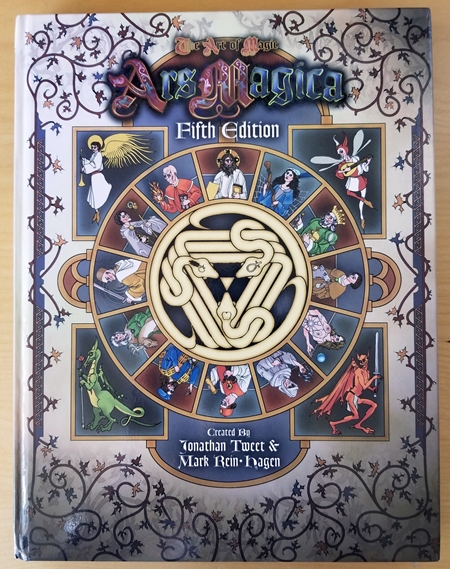My Seattle group is coming up on a year of Ars Magica [paid link] play, using 5e — my first experience with Ars. We’ve played around 20 sessions (I’ve missed a couple, but I’ve been there for 18), covering about a year of in-game time, and I say without hyperbole that I will happily play this campaign until I totter into a nursing home if that’s an option.
Out of the roughly 130 RPGs I’ve played, Ars Magica is one of only two games that I currently rate a 10/10. Here’s why I love it so much.

Ars is above the crunch level I’d usually consider for a long-term game (purely a personal preference), but every bit of that crunch is put to good use — it’s not just there for the sake of it. The game mechanics tee things up to deliver meaningful, engaging play by taking full advantage of that crunch — and you don’t need all of it at any one time. The core mechanic is quite simple. The game design, by Jonathan Tweet and Mark Rein-Hagen (the original designers), with David Chart at the helm of fifth edition, is brilliant.
It’s also a fascinating, unique beast in many different ways. It’s designed for troupe play: We have six players, and each of us created two characters for ourselves (a magus, who is central to the campaign but goes on fewer adventures than one might think, and a companion, a sort of “anything goes” character you typically wind up playing more often) and three grogs — minor characters — for the group. Every session, we divvy up characters differently.
Someone plays their magus; they’re in the spotlight. A couple folks play their companions. The others pick suitable grogs from the pool (whether they originally created them or not), and take on a supporting character role. And in the background, the other ~40 characters who live in and around our wizard tower keep the place running, just like a medieval manor house. It’s beautiful.
And then there’s the temporal scope, which is epic: Wizards can live for a really long time. You can pace play however you like, but it works well as a mix of seasonal and in-the-moment play. During seasonal play — which could be at the table or “offline,” between sessions — you raise skills, read magical tomes, add buildings to your covenant, and the like. That’s interspersed with adventures, typically one or two per year, where you undertake whatever the hell the wizards think is important.
And then — and then! — there’s the magic system, which mixes formulaic spells with spontaneous magic using a brilliant set of mechanics. It’s all built around combining a verb, like creo for creating something, with a noun, like aquam for water. You can look at any wizard’s stats in those verbs and nouns and have a pretty good idea of what they’re capable of — which is a LOT. I keep underestimating how good our novice magi are at doing all sorts of shit that would just wreck other RPGs. And the game supports just coming up with wild shit, plugging into the framework of the rules, and making it happen.
And it all has consequences! The characters exist in a web of responsibilities, intrigue, danger, obligation, relationships, power plays, and machinations that lends weight to everything you do at the table.
There’s so much to Ars, both in terms of the rulebook, which isn’t small, and in terms of the scope of play and the setting itself, that I really have no idea how to encapsulate it all in a blog post.
The short version is that Ars Magica [paid link] is a thing of beauty, and I love it.
